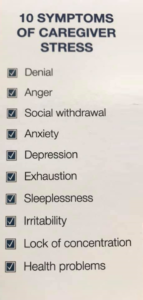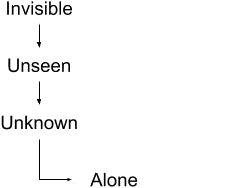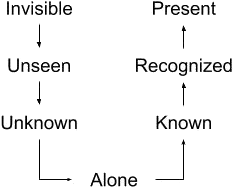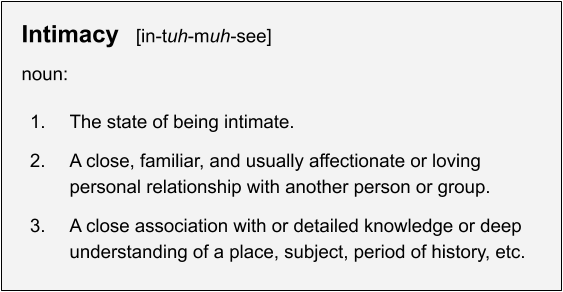This post describes, in part, the effects of a degenerative neurological condition called Huntington’s Disease. Any negative behavior on the part of my wife should be attributed to that condition. Any negative behavior on the part of myself should be attributed to my need for God’s ongoing grace.
This week is the beginning of Lent, so perhaps appropriately, it’s been a rough week. Early in the week, the perseveration was running wild. Tuesday she was calling me every 5 minutes at work, angrily demanding (in the same sentence) that I both save the marriage and give her a divorce. My boss noticed and was understanding when he called me in to talk about what was going on, I just sat in his office and cried. The result was that he let me work out of the house two days this week so I can be here with Janet. She seems much more at ease if she knows that I am in the house, even if I am upstairs working.
After our “meet and greet” at the Thai restaurant in downtown Boston, the first real date for Janet and I was at a family party. Janet had a niece that was born on Christmas Day so Janet invited me to go with her to the combination Christmas and Birthday party at her younger brother’s house. Shortly after we arrived, Janet got spirited off for some family matter so I was left standing uncomfortably alone in the middle of the living room. A short while later a tall, attractive blond lady that I later found out was Janet’s sister-in-law Marilyn came up to me.
“So you are Michael.” A statement. “Have you and Janet been dating long?”
“Uh no,” I replied, smiling nervously, “This is actually our first real date.”
Marilyn looked at me hard and said to no one in particular, “For a first date she brings him to a family gathering. My God! She’s brave!”
And with that she turned on her heel and walked away.
Y-e-a-h… Welcome to the family…
Sometimes what you read in this space is about what Janet and I have been through, and sometimes it’s about what I see online on the support forums – this one is a mixture of the two.
It seems like I have been seeing a lot of comments lately from folks that are feeling guilty, and the source of that guilt is very familiar. The post I saw that really sort of crystalized it for me was a woman whose husband had become unable to express himself romantically and she had two questions:
“Is this normal in HD, and am I selfish for still wanting things to be the way they were before?”
My answer was short and sweet:
“Yes it is, and no you’re not.”
The longer (more piquant) answer to her second question is that grieving the loss what you had is not, of itself, selfish. Becoming a caregiver doesn’t mean giving up your rights to have needs. Rather, even in the midst of the most trying of times, human needs still have a place. For example, consider one of the events that occurred while Jesus was hanging on the cross. He looked down and saw His mother with His disciple John. Even in the midst of what could be argued was the paramount point of all human history, He looked down and said to her, “Woman, behold your son.” and then to John, “Behold your mother.”
Devoid of any deep theological or philosophical meaning, the point of those statements was simple. A widow with no sons in that culture and time was in many ways essentially a non-person. She had no name, no standing in the community and no resources. We have to be careful here to not attribute to Mary too much spiritual insight. There is no evidence that she had understood the prophecies that Jesus made about His death and resurrection any better than the disciples did – remember she showed up at the tomb Easter morning expecting to find a dead body.
So you know she had to have been thinking about it. “My husband is dead, my son is dying, what will become of me?” Hence, even in the middle of “making all things new”, Jesus took time to deal with the very practical, very human need of His mother by making sure that she still had a place in the world.
Returning to the present for a moment, there would also be those who would say to caregivers, why are you worrying about your needs? Don’t you have faith in God? Real nice folks, eh? You are doing your best to hold things together and they give you the Christianized version of the “Just snap out of it, and cheer up!” speech. But again, being needy is no more a lack of faith than it was selfishness. Remember the shortest passage in the Bible: Jesus wept. More than anyone alive then or now, Jesus standing at the tomb of His friend Lazarus understood the situation, He knew where Lazarus was, and He knew that Lazarus truly was in a better place. But He also could see and feel the grief of Mary and Martha who, more than anything in this world, needed their brother back. So Jesus wept: for Mary, for Martha, and perhaps a bit for Lazarus too.
In our humanness we have needs, we miss things, we long for what was and what was good, and there is nothing wrong with that. The good news is that support and comfort is available, that is why God gave us each other. But for me, that doesn’t mean that these new resources for comfort and support replace what I had with Janet. In the first place, they aren’t sufficient to fill a void so large and in the second, I wouldn’t want them to anyway. Those are precious memories and feelings that I don’t want lost or replaced. At some time in the future after Janet dies I may or may not find someone else with whom to share life, but if I do, that relationship won’t simply be a replay or continuation of what Janet and I had. It will be something new and unique that God creates for us.
So although the support we can give to and receive from each other now has its limitations, it is nevertheless tremendously valuable, because what it can do is help me survive the pain and fear that I am experiencing right now.
The other thing to remember about the pain of neediness is that injuries take time to heal. This point is obvious when someone is cut, bruised or breaks an arm. Then people say, “Ok they are injured. They need to take it easy for a while.” Unfortunately, though, when the injury is to the person’s heart and spirit, the tune is very different. They expect the healing to be instantaneous. Just say a prayer and it’s all handled. Except that it’s not. Consequently, people are often reticent to open up about what they are experiencing for fear of being judged as “faithless”.
For myself, I’ve had to fight my way through these feelings in a very public way: I’ve been writing about them for the past three weeks and every Sunday morning people were expecting an update. During this time I have learned volumes about being steadfast by sorting out exactly what “loyalty” means. I have learned that living a spiritual life is anything but formulaic. I learned that at times truth and honesty can be risky, and that healing in itself can be a painful process. But the biggest thing I learned was that this process takes time. God doesn’t often snap His fingers and heal broken bones, or broken spirits.
But, even in my pain, I have faith because I learned a long time ago that in my life journey, nothing happens by accident. Instead God assures me that there is always a purpose behind what I am experiencing: growth. As a parent, God wants me (and indeed, all His children) to grow stronger and more capable over time, and so be as prepared for life as we can possibly be. However, sometimes gentle words and persuasion won’t get the job done. Sometimes the future ahead of us is going to be so hard that, to be prepared for it, we have to go through a kind of spiritual “boot camp” to toughen us up.
For me, a key part of that toughening up was when my Mom had a stroke while visiting family in Arkansas. An uncle had her admitted to the nearest hospital with a stroke unit – which it turns out was Mercy Hospital in Fort Smith. I drove up from Pearland and arrived the day before a major snow and ice storm that totally shutdown the city for about a week. While Mom was in the hospital, there were a lot more bad times than there were good. Mom was often hallucinating and one night over the course of an hour she mistook me for her father, my father, both of her brothers and a stranger that was trying to attack her.
From the time I walked in the door of the ICU, I was assumed by the doctors and nurses to be part of the care team, which in one sense was really great. Of course, it would have been even better if I had had some idea of what was going on and what needed to be done. As it was, what I went through was not unlike learning to be an infantryman while storming an enemy beach.
After a couple very long weeks where I literally lived at the hospital with Mom, they determined that she was stable enough to transport down to the Houston area. As I was driving back to make arrangements for her here in Pearland, I was totally exhausted. Then God interrupted my thoughts and told me, “Of course you know this is just Round 1”. After thinking about the statement for a moment, I understood. After Mom, Janet would come next. Janet would be the one suffering from dementia. Janet would be the one in pain. Janet would be the one confused about where she was. Janet would be the one frightened and angry. Janet would be Round 2.
And I’m now praying there is no Round 3 in this bout.
In Christ, Amen ☩
A prayer for when you are needy…
“Blessed are You, Lord God, King of the Universe. It is right that I should at all times and in all circumstances bless You for all the ways in which You provide for all my needs. But today I want to bless You especially for even caring about my needs. You certainly would not have to, but in Your immeasurable love, You do. Please show me how to care for the needs of others as You care for mine. Amen”




